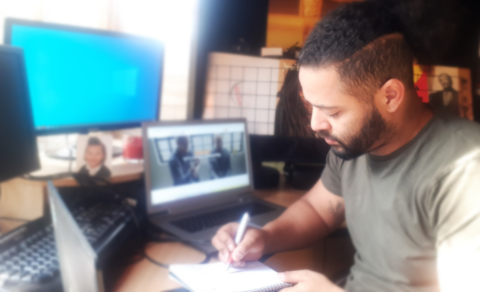Launching in Lockdown: The Dark Side of Entrepreneurship
Launching in Lockdown: The Dark Side of Entrepreneurship

Theo Francis
Founder - GuineaPig
Launching in Lockdown: The Dark Side of Entrepreneurship
The launch of my startup GuineaPig Fieldwork has been, for the most part, a tremendous success. After just 3 days of being officially open for business, I commissioned my first project, then had another booking a week later. Last week, I received confirmation on 2 more projects, bringing my tally to 4 bookings in the first month.
In the eyes of a more established agency, these are small numbers and nothing to brag about but for a small, nimble newbie like me with next to no overheads, this month has been game changing!

Still, despite all of this positivity and my own "back-patting", this first month in business has not been a walk in the park. I’ve discovered that sailing your own ship is just as exciting and exhilarating as it is stressful and tiresome. Although I did expect this would be the case, I would be lying if I told you that there haven't been a few incidents that have caught me off guard.
I could give you a list of lessons that I have had to learn quickly but if I did, you’d probably switch off as the article would be so long! So instead of doing that, I’m going to share with you the most valuable lesson I’ve learned so far:
Passion ≠ Obsession
What was surprising to me was that this learning has been much more related to my personal life than simply a lesson in business: It has to do with finding the right balance in your business and personal life and the reasons why this is so important to the success of an entrepreneur.
Before launching GuineaPig, I'd read and heard about the insane motivation and drive that entrepreneurs experience when setting up their own businesses for the first time. The notion appealed to me and I could not wait to feel that level of passion and excitement coarse through my veins.

Sure enough, upon the official launch, it hit me. Overnight I became intoxicated by an emotional cocktail of excitement, anxiety, pride and fear. I had more energy than I knew what to do with, I was unable to sleep, I’d wake up earlier than intended and proceed to lock myself in my home office (the shed) from morning until night, pausing only to either wolf down my dinner, make a strong coffee or answer nature's occasional call.
Grant Cardone, author of the book “Be Obsessed or Be Average” wrote in an article on Entrepreneur.com that "you must be fanatical about success so the world knows that you will not compromise or stop". He goes on to say “You need to show up every day and take massive action and follow it up with more action. You cannot take breaks or sit on your laurels. You need to stay seriously motivated to take 10X actions every day no matter what -- sick, healthy, happy, sad.”

Thinking in this way does add fuel to that fire in your belly and I do feel that to some degree, Grant is right. You need to dedicate yourself to your business everyday and put the work in if you want it to succeed. Nobody is going to do it for you.
That being said, in this first month I have noticed that there is a dark side to this level of “passion” which has some negative side effects both on the entrepreneur personally and also the people around them.
We often hear about the sacrifices entrepreneurs are forced to make, but the pressure put on those closest to them is something that rarely gets a mention and indeed, that pressure began to foster some negative feelings in our household.
After about the third week of excessive obsessive me, my wife went from being super supportive of her enterprising hubby, to super sick and tired of being left to do everything in the house, whilst also taking care of our two extremely hyper locked down kids on her own plus not even getting a conversation out of me because I was too busy working.

I could tell that my friends and family were also becoming frustrated with me, as in the odd chance that I actually answered their calls, all I seemed to be able to speak to them about was GuineaPig and when they’d try to talk about something else I’d quite clearly zone out until I could bring the topic back to business.
I started experiencing mood swings, bouncing between happiness and contentment to depression and anxiety several times a day. I became irritable and got frustrated whenever the kids or my wife would ask for even a minute of my precious time.
Things finally came to a head late at night on a Saturday, when after finally getting the kids off to bed and setting up Netflix for some long overdue quality time with my wife, I spent the first 40mins of the movie messaging a potential client on LinkedIn. Needless to say, she was very annoyed, some harsh words were said on both our parts and I ended up spending the night on the sofa contemplating where it had all gone wrong.

The conclusion I finally came to is that there is a thin line between passion and obsession and it was time to take a step back and rethink my approach.
Starting a new business is anxious work. Faced by the constant threat of not knowing whether or not you’ve done enough to make it past the next few months, many entrepreneurs take the approach that the more hours they put in, the better their chances of success will be. In theory, this logic makes perfect sense but in practice, it doesn't. Working yourself into the ground and putting your relationships into turmoil is, I feel, the surest and fastest route to higher than necessary stress levels, burnout and could even result in the downfall of the very empire you’re trying so hard to build.
Last year, research agency Opinium supported by MRS, launched the results of research into mental wellbeing in the research sector. The report ‘Opening the Conversation: Mental Wellbeing in Market Research’ showed that, while 53% of workers in the UK say they have had issues with their mental wellbeing, an alarming 85% of market researchers report that they have struggled in the past year. With 77% admitting that this had affected their work. You can read more on this report here - https://www.mrs.org.uk/resources/mental-wellbeing-in-the-sector
The topic of Mental Health and the importance of protecting it is at the forefront of conversation and awareness throughout almost every sector in the business world. We tend to idolise entrepreneurship and view the likes of Zuckerberg and Bezos as business rockstars (which they are) but less commonly known is the heightened risk of mental health issues that entrepreneurs face.
A study by the University of San Francisco researcher Michael A. Freeman showed that approximately one half (49%) of entrepreneurs suffer from at least one form of mental health condition during their lifetimes. These include depression, ADHD, bipolar disorder and a host of addictive disorders.

Taking all of this into account, it seems clear that a stressful, obsessive approach to business probably isn't the most effective way to launch a start-up and could end up doing more harm than good in the long run.
In an article on MarcollieBlue.com, Ian Ivey writes "The most successful entrepreneurs I know are very people-centric and think of what others want and/or need rather than their own obsessions. They are not so much obsessed but rather passionate about what they do. Passion is quite different to obsession. Obsessed people often operate in quite blinkered environments and can't see the wood for the trees. That can easily lead to failure"
I decided to make some changes. First, I put a work schedule in place and stuck to it. I still work more hours than is the norm but when I log off, I really log off and leave any emails that come in over night to be answered the next day. I started cooking dinner again, spent time with the family in the evenings and made an effort not to talk about business all the time.

When crafting this plan, I worried that less hours behind the laptop would inevitably mean less productivity. However, to my surprise, scaling back to a normal work schedule hasn’t negatively impacted my productivity at all. In fact, based on the last week and a half, I would even argue that productivity has gone up, as after giving myself some healthy down time, I've noticed that I'm sharper, more efficient and happier - and in my opinion, happiness is the key ingredient for long term success that many seem to ignore.
So, does an entrepreneur need to be obsessed in order to be successful? Or can obsession actually hinder your progress?
Grant Cardone would probably tell me I'm wrong but based on everything mentioned above, I now actually believe the latter is the truth and am working towards becoming less obsessive in my quest to build a successful startup business.
I'm not there yet - the business is still at the forefront of my mind from the moment I wake up, I still struggle with sleep and when I do sleep I dream of Guinea Pigs but I’m making effort to give the family the attention they deserve, to take better care of my body and allow myself some occasional down time.
I think this message is important because often us entrepreneurs hear about the "spirit of hustle" and get sucked into the hype of believing that the only way to be successful is to spend 12-16 hours a day, 7 days a week, hunched over your computer growing your business. In reality, that's not sustainable. If we instead focus on being productive instead of busy, have a more realistic work-life balance and allow ourselves the time to recharge our batteries every once and a while, I believe we can be far more effective at achieving the high targets and goals we set ourselves to succeed.
I will be sharing further progress in future articles on LinkedIn, so please do follow the Guineapig Fieldwork page and join me on this journey.
Stay safe and stay motivated!





